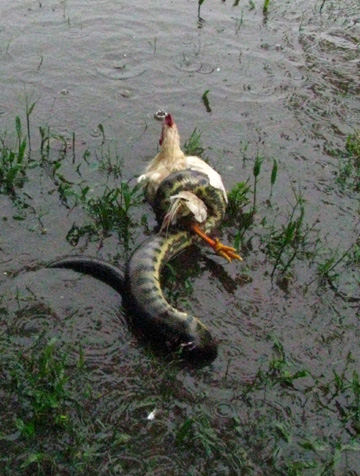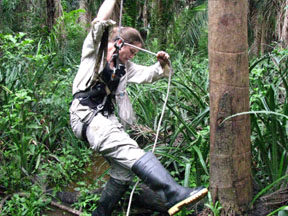The macaws continue incubating their two eggs, high and dry in their nest box, while the people of the Bolivian lowlands do not fair quite so well.
January 29th
5:45 p.m.—in the blind
The rain was dumping down all morning and the water rose to within inches of our tent. The vicious red ants are as desperate as we are for a dry spot to set up camp and are trying to colonize the walls and roof of our tent.
--small.jpg)
Earlier today an anaconda swam into the flooded yard and grabbed a big, white rooster. The kids came running towards their father, screaming "SicurÃ! SicurÃ!" (Anaconda). Steve got some amazing photos of the 5-foot snake, coiled around the rooster, before Rolando killed it with machete. The rooster survived, though it was squeezed so hard that it looked as though its eyes would pop out. I felt very sad for the snake, however I can not hold it against Rolando and Lurdes that they need to do all they can to protect their animals. They have six children to feed and one rooster is worth a lot.

The mosquitoes are driving me insane inside the blind right now. The eggs still haven't hatched and I couldn't feel any movement within the eggs when I checked them today. I am beginning to doubt that I ever did feel movement in one of the eggs. Maybe I was just feeling my own pulse in my fingertips and mistook it for the tiny movements of an embryo. We have been here for 9 days and it is known that the eggs were being incubated for at least one week (and probably 2 weeks) before we arrived. That means that the latest they could hatch would be two weeks from now. I suppose I had better stop being impatient and settle in for the wait.
One of the reasons for my impatient is that Steve and I have to get to town soon and I don't want to leave the nest during this most vulnerable stage. Upon our arrival at Encanta, we thought it would be easy to travel to town for a day or two, just by riding a horse to Esperanza and then taking the daily public transportation to Trini. Now, boat is the only means of transportation. The current news is that someone from Esperanza will try to get a canoe from Trini. I just hope someone gets a canoe before February 15th, the current date for Steve's departure flight, which he will change whenever we can get to a phone.
--small.jpg)
9:00 p.m.
I am now in the tent, having escaped from a ravenous cloud of mosquitoes that appeared and engulfed me when I decided to give myself an extravagant bucket bath on the chapapa. A chapapa is a makeshift, table-like structure, perhaps more accurately translated as "platform". A chapapa, unlike most tables, often has spaces between the planks, sticks or logs that make up its surface and can be quite partial to falling down, even when used properly.
I dislike standing in the mud while I bathe, especially because there is something that always bites my toes-little painful pinches, as if there were aquatic ants. So, in preparation for my bath, I carried a bucket of water from the pond to the chapapa. The chapapa, near the well, is entirely surrounded by water and perhaps it seems a bit odd that I would carry a bucket of muddy water from across the yard, only to bathe, surrounded by the same, muddy water. However, I think the pond water smells less like cows and so I prefer it. Anyways, when I tried to stand on the chapapa so I could bathe without getting my feet muddy, I discovered that many other creatures had had the same idea and climbed up the chapapa to stay dry: mostly a bizarre variety of ants and spiders. I decided I could share the chapapa with these critters and began to soap up until, halfway through my bucket-bath, the chapapa fell down, dumping me, my clothes and my towel into the water. So I stood in the mud and continued my bath, lamenting my wet clothes and towel...and then the mosquitoes attacked, making me prance around naked, splashing around in the water and slapping at my body. Finally I ran, soaking wet, for cover in the tent. Now I am dry and the tent is damp. I hate bathing.
I hear great-horned owls, hooting faintly in the forest, across the pond. The frogs and bats are croaking and squeaking so loudly all around me and over head that the noise level is almost uncomfortable. I hear soft voices and laughter from the family in the house. A horse snorts. I hear Steve's soggy footsteps as he returns from his anti-frustration walk. The three guys at Esperanza go to Trini tomorrow and John (a project employee who is working at Esperanza) will supposedly be back on Saturday.
On Sunday we might know if there will be a canoe to get us out of Encanta. Maybe the series of trucks and boats is up and running, to get people from Loreto to Trini. (Note: Loreto is a tiny town, 15 KM from Esperanza, which normally has daily transportation to the big city of Trinidad.) Or maybe one or all of the parts in this line of transport are not working. Maybe there is a motorboat that can go all the way from Loreto to Trini. Maybe not. Maybe there are planes flying from Loreto to Trini. Maybe Loreto's airport is already flooded. Maybe it will rain more and boats will be the only option left. Maybe it's done raining for a while and the water will go down enough that we can use horses.
Rolando says that probably the guy who might be looking for a canoe in Trini won't find one because canoes are currently in high demand, but Rolando may be able to borrow a canoe from a neighboring estancia. No one knows any more than all of these maybes and probablys and probably nots, and the for sures that are never for sure, but it doesn't matter-that's just life in Bolivia.
January 31st
Yesterday we were finally flooded out of our tent- the little island on which the tent was perched is now underwater. I rescued all our stuff from the tent in the middle of the 4-hour downpour (while Steve was watching the nest) so that our sleeping bags were only marginally damp. By the time the rain stopped and we were able to move the tent it was filled with 6 inches of standing water. We are close enough to the river that with this flood we are now part of the river system. The water has a current, flowing along with the river Ibaré from South to North.
Even the water in the forest has a current. What was once a path leading to the nest is now a knee-deep stream with a current. The water I walk through to get to the nest was probably in Loreto a few hours earlier, and will be heading north towards Trini after passing through Encanta.
At 8km, we are far enough from the main river that the current is slow, but we are all grateful for the current because it keeps the water cleaner. It hardly seems like more rain will make much difference anymore, since we already moved our tent to a raised platform (chapapa) on higher ground and the water is so deep that our boots are flooded during the daily walk to the nest. Of course I wouldn't wish more suffering on the people of Trini, thousands of whom are already flooded out of their houses and living in makeshift tents on higher ground.
The water is already higher than it got during last year's flood, but Rolando says that it's not really any worse because this year people had a little more time to prepare and knew just how bad it could get. Last year huge numbers of livestock died, as well as wild animals. Lurdes says that anytime now the armadillos should start arriving by the dozen to the higher ground at the house and yard. They even climbed up into the oven last year, she tells me, especially if it had been used recently because the thick, baked mud walls retain heat for a long time.
On the topic of ovens, the method of baking here is quite interesting. The oven is a mud-walled mound, very similar indeed to a Hornero's mud nest (horno = oven in Spanish), only differing in that the real oven has 2 openings (one on each side) to facilitate making a fire and cleaning out the ash. To heat the oven, it is stuffed with wood and coals from the kitchen fire and stoked for at least an hour, until its blazing hot, and the entire oven (including the mud walls) are at the proper roasting temperature. Then all the wood and coals are removed, the food is put on a tray in the oven and the heavy doors are replaced and held shut by long wooden poles, braced against the ground. The structure holds heat so well that it will not need to be re-heated and can even cook a tray lined with huge chunks of meat...or an armadillo.
I am sitting in the blind where a cool breeze has just picked up. It feels like it might rain again. The female is on her nest, but I am worried about the fate of her two eggs. When I arrived here at 8:00 she was nowhere to be found and didn't show up at the nest until 8:45. Now it is 9:30 and she is still in her nest, incubating, but it's very odd that she would be gone for so long. The pair is definitely acting strange. The male entered twice in one hour, each time for less than a minute.
Our first signals of failure at the Vaca Muerta nest, in early December, was when the male repeatedly approached the nest (with incubating female inside) screaming, went in and out of the nest, and then sat near the entrance, screaming, as if trying to convince the female to abandon the dead, broken eggs. The male here at Encanta is still being silent near the nest, so hopefully everything is fine. Oh, please, please let the eggs hatch!

































